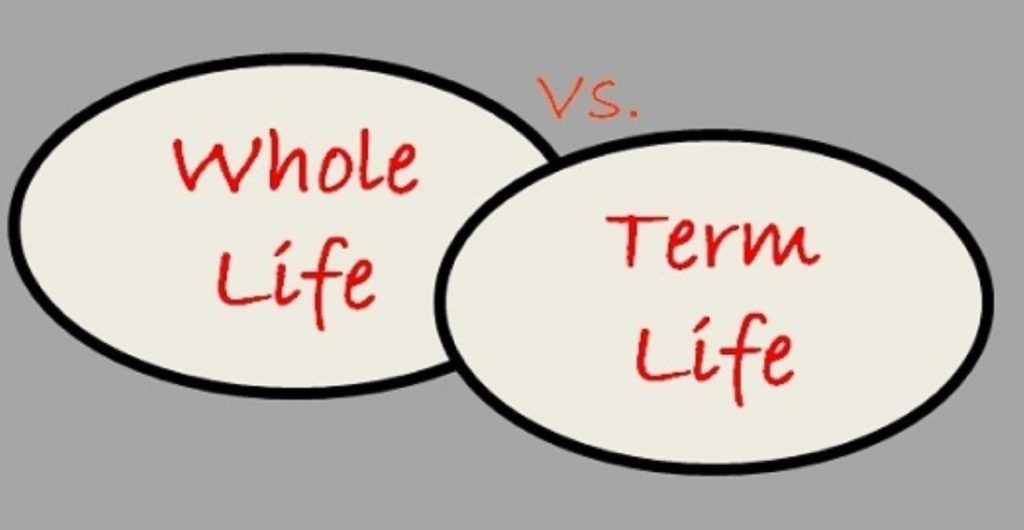When you purchase a life insurance policy, essentially you are providing a safety net for your loved ones if you’re not around to provide for them. With a life insurance policy, your family can use the benefit to cover burial costs, mortgage payments, and kids education just to name a few.
If you have ever looked into buying life insurance then you know that there are two main types:
- Term Life: Easiest to understand and the premiums are the lowest. You can obtain quotes for term life online.
- Permanent Life: These policies tend to be more complex, but offer additions features, such as cash value. The most well know permanent life is whole life insurance.
- Universal, Variable Universal, and Index Universal Life are the other kinds of permanent policies.
In this blog we will be analyzing the decades old question:
“What is better: Term life or Whole life?”
What is Term Life Insurance?
Often referred to as “pure life insurance” because it protects your loved ones if you die prematurely, term life insurance provides coverage for certain amount of time (10-30 years). If you own a term life policy and die during the term period, your named beneficiaries receive the death benefit. Other than the death benefit, these policies have no other value (unless you add riders).
Not all term life insurance is the same either. Here are main types of term life:
- Level Term Life (most commonly sold)
- Decreasing Term Life (used primarily for loans, such as a mortgage)
- Annual Renewable Term
- Level term life insurance is the most popular term product on the market mainly because of its simplicity. When you purchase a level term life policy you choose the term length and the amount of death protection you would like your loved ones to receive. The term lengths come in 10, 15, 20, and 30 years, depending on your age. With level term life policies the death benefit and premium are level for the duration of the term period chosen.
- Decreasing term life insurance is designed just like it sounds. The death benefit decreases each year, usually to coincide with some type of loan like a mortgage. The main drawback is as the benefit decreases the premium remains the same. In essence, the longer you live the worse this policy becomes.
- Annual Renewable Term life insurance is a policy that is designed with a premium increase each year as you grow older. These policies start out with extremely low premiums, but over time increase drastically and usually become to costly for most to keep. The death benefit remains level.
Top Reasons to Purchase Term Life
- Pay off mortgage
- Children’s education
- Funeral expenses
- Credit card debt or student loans
- Income replacement
- Affordable premiums
Things to consider when shopping for term life insurance:
- Always choose a term period that matches with the number of years you expect to be paying bills and debt off. You want the life insurance to be in force when you die.
- Make sure to choose the right amount of coverage your loved ones would need if you are no around to continue providing for them. The industry opinion is around 10X your salary.
The idea is for you term life policy to end the same time you have paid you debt off, saved a retirement to serve as a safety net, and the kids are out on their own.
All the top insurance companies sell term life, but not all their prices or products are the same. Make sure to look at all your options before settling.
What is Whole Life Insurance?
Whole life insurance, like all permanent policies, provides coverage for life. Whole life also includes a cash value component that usually grows slowly and tax deferred.
You are able to borrow from the cash value or surrender to obtain the money accumulated. Any money borrowed from the policy could reduce the original death benefit and if you surrender then you no longer have coverage.
Their are two types of whole life policies to choose from:
- Non-Participating: These policies cash value only earn the guaranteed values promised by the carrier when a contract is signed.
- Participating: This whole life policy not only gets the guaranteed values but also earn dividends, which a portion of the carrier’s financial surplus for each year. Dividends are not guaranteed, so they will fluctuate from year to year. You are also able to withdraw the dividends, leave them to earn interest, decrease your premium, or buy additional coverage.
Top Reasons to Purchase Whole Life
- Lifetime Coverage
- Guaranteed Cash Value
- Estate Planning
- Funding a Special Needs Trust
- Level/Guaranteed Premium
- Burial Expenses
- To Leave A Legacy
Term Life and Whole Life Policy Differences
The Major Differences Between Term and Whole Life
Cost & Length of Coverage:
Term life insurance in most cases is about 70% cheaper than whole life insurance. You are able to purchase a lot more coverage using term life insurance than with whole life, and this is why term life is so popular.
The fact of the matter is that most people out live their term life policy which is why premiums are so low. The only way you out live a whole life policy is if you surrender the policy or quit paying premiums.
The premiums with whole life policies are higher because you have the coverage for life and it comes with a cash value component that can be used for various expenditures.
Check out the Price Difference
How Do I Choose?
While term life is sufficient for most families, whole life and other permanent life can be the right fit for some circumstances.
Our Thoughts:
You really can’t go wrong with either one of these two life insurance products. They both have the ability to protect any of your life insurance needs. Always consult with an experienced agent who can show you all your options and help guide to the policy that best fits your unique situation. If you have any questions or comments please don’t hesitate by commenting below or giving us a call.
Frequently Asked Questions
What are the major differences between term life and whole life?
The major differences between term and whole life insurance are:
-Length of Coverage: Term only last a certain number of years
-Premium Costs: Term is going to less expensive
-Cash Value Accumulation: Whole life builds up cash value
What is whole life insurance?
Whole life insurance, like all permanent policies, provides coverage for life. Whole life also includes a cash value component that usually grows slowly and tax deferred.
What is term life insurance?
Often referred to as “pure life insurance” because it protects your loved ones if you die prematurely, term life insurance provides coverage for certain amount of time (10-30 years). If you own a term life policy and die during the term period, your named beneficiaries receive the death benefit. Other than the death benefit, these policies have no other value (unless you add riders).
What are the top reasons to buy term life insurance?
The top reasons to buy term life instead of whole life are:
Pay off mortgage
Children’s education
Funeral expenses
Credit card debt or student loans
Income replacement
Affordable premiums

